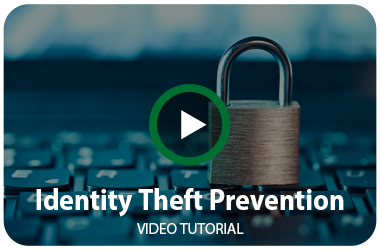Identity Theft Prevention
Never give your personal credit information to anyone, unless you are absolutely certain of their legitimacy — regardless of what claims they may make or otherwise.
REPORT SUCH OCCURENCES to us and proper law enforcement agencies. To safeguard against identity theft, we offer these tips.
- Never give your social Security Number, bank account numbers of credit information to anyone who calls you.
- Tear up receipts, old bank statements and unused credit card offers.
- Don't mail bills from your mailbox. Thieves may use them to change your address.
- Review your monthly accounts for fraud regularly.
- Order copies of your credit report once a year to ensure accuracy.
- Protect your Personal Identification Number (PIN). Don't carry that information on you.
- If you are unsure if an email represents Grant County Bank, do not respond or click on any links/attachments, contact the bank immediately.
- If you are unsure if a caller represents Grant County Bank, hang up immediately and call one of our office locations.
For more information about identity theft prevention for yourself or for your business, please look over our Security Headquarters document or visit our Identity Theft Prevention microsite.
{{ identity-identity-theft-prevention }}
Internet Security
Your safety on the Internet is important to us. Grant County Bank will never contact you via email to ask for personal information such as log-in IDs, passwords or PIN numbers. For up-to-date information on the latest scams and how to protect yourself, please visit OnGuardOnline.gov.
In addition, recently some card issuers and financial institutions across the industry have experienced an increase in attempts by unknown fraudsters to break debit card verification value/card verification code (CVV/CVC) on compromised cards, and thereby to commit card fraud, including ATM fraud.
This attempt to commit fraud is commonly known as a "brute force attack". To execute these crimes, email is often used to transport phishing scams and malicious software (malware) to obtain personal information, including personal identification numbers (PINs) and to take over legitimate merchant accounts to test the compromised cards.
You can help to reduce the likelihood of success of these attempts to commit fraud by being alert for email that (1) contains unfamiliar or suspicious links or attachments, (2) is unsolicited and/or from an unknown sender, (3) is sent multiple times from different senders or (4) contains poor grammar or incorrectly spelled words. If you receive email that contains any of these elements or any combination of these elements, you should delete it immediately. Do not open it, click on the links or any attachments. Also, you should not attempt to reply to the email or forward it to anyone.
Should you ever have questions about a suspicious email or phone call, always contact someone you trust to review the source before you provide any information.
For more information about internet security for yourself or for your business, please look over our Security Headquarters document or visit our Identity Theft Prevention microsite.
Kasasa Protect®
In addition to the security measures we take, you can also protect your account information by signing up for Kasasa Protect. Find out more about this identity protection and restoration solution.


